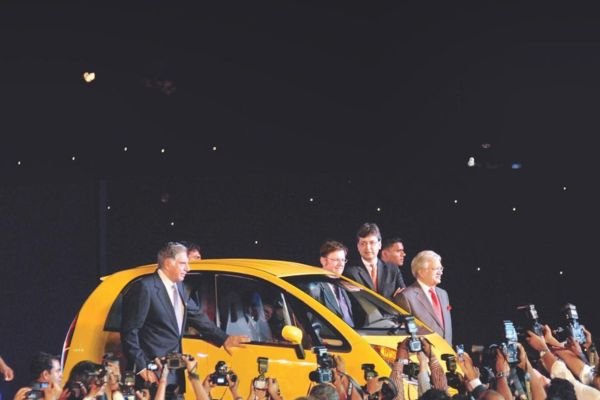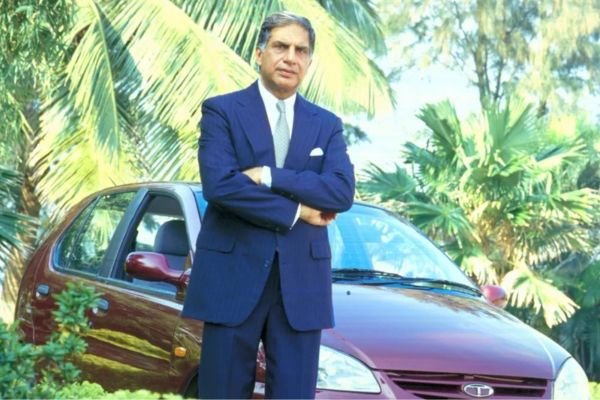No leader better exemplifies the concept of excellence, philanthropy, and low-key leadership in the entire world than Ratan Tata. Many regard him as one of the most admired and respected business leaders in India.
Hugely propelling Tata Group to new heights, with no doubt at all that his contribution was big for the business fraternity and society at large. This blog will start unrolling his life at its initial stages, the education he received, challenges he encountered, success he obtained, failures, and above all, the outstanding legacy he leaves behind.
Early Life and Birth
Ratan Tata was born on December 28, 1937, in the vibrant city of Mumbai, India, and is a part of the Tata family, which molded India to what it is today. Although his father, Naval Tata, had more influence in the Tata family, it was when he was only 10 years old that his parents separated, and he was raised by his grandmother, Lady Navajbai Tata. Disturbances within his emotional life formed his early years, though that was the crucible in which his family values shaped him and formed his character.
Education
The education of Ratan Tata began at the Campion School in Mumbai and was further pursued at Cathedral and John Connon School. He has completed a graduation degree in architecture abroad from Cornell University in the US. Later he did his Advanced Management Programme from Harvard Business School in the US.
In fact, a foreign education would perfectly mold him for a much larger global perspective that would help in achieving not just strong international acumen but also the reach of Tata – which is the element complementing the growing nature of this group.
Career Life and Trials
He was a rare exemption as most successors of business families start as a successor to their respective businesses. He practically started from scratch, commencing his career in the Tata Group way back in 1962 as an apprentice at Tata Steel. Instead of being provided with special treatment, he worked on the shop floor with other workers so that he learned everything from scratch about the business.
The problems thrown up against Ratan Tata, when he took over the reins at the helm of Tata Sons in 1991 were many. With enterprises diversified in almost every sector, the Tata Group had companies struggling badly. Besides, there was a question mark over his leadership acumen as the top management of the company questioned his potential to handle such a mammoth house.
Successes and Major Achievements
Making Tata a Global Giant
While still being the head of Tata Group, Ratan Tata transformed the former into an international conglomerate. There is one obvious act: through acquisitions and the enlargement of Tata’s footprint on an international level. Many people bashed Ratan Tata when in 2008 he bought Jaguar and Land Rover. However, he proved all the haters wrong, and his company, Tata Motors, emerged as one of the top names for luxurious cars.
Emergence of Tata Consultancy Services (TCS)
Tata Consultancy Services has been one of the most triumphant projects under him. TCS emerged as one of the worlds largest providers and played a significant role in turning India into a technological hub of the global world.
One of the most innovative project undertaken by him was Tata Nano.
One of the much-desired projects Ratan Tata envisioned was the Tata Nano, introduced to the world as the cheapest car ever made, an endeavor to bring cars within the reach of millions of Indians. Though this did not achieve the amount of expectation it could have for myriad reasons, it still became a symbol of Tata’s commitment towards innovation and serving the masses.

Dealing with Failure with Dignity
Similar was the case with Ratan Tata who also had his share of failure. Though ambitious, the Tata Nano project had failed to bring in the results in the form of commercial success that it was envisaged to deliver.
The same holds good in the case of Tatas venture into the airlines industry through Air India and Vistara with massive struggle. Ratan Tata never backed off from learning through failure that made him a stronger leader as one learned better handling failure.
Philanthropy and Donations
Ratan Tata is not afraid of philanthropy and is one of the brightest business brains in the world. The Tata Group keeps most of their money in charities trusts, hence donating billions of dollars for any cause under the sun.
Tata Trusts
The Tata Trusts sponsored the projects founded by the Tata family, which include education, health care, rural development, and alleviation of poverty. The money generated from the Tata Group went into changing the lives of millions of Indians.
Major Donations and Contributions
COVID-19 Relief: Contributed ₹1,500 crore in the PM CARES Fund to help India in this war against the pandemic by Tata Sons and Ratan Tata
Healthcare: He supported healthcare initiatives, including Tata Medical Centre in Kolkata, providing top-class cancer treatment for the underprivileged.
Education
Harvard Business School: Contributed $50 million in endowment support for an executive center.
Cornell University: Contributed $28 million for a scholarship fund for students in India.
Carnegie Mellon University: Dedicated its $35 million to education programs.
Total Philanthropy Donation: Ratan Tata has donated over $1.2 billion approximately (₹9,000 crores) towards various philanthropic cause initiative primarily set for education and healthcare, and rural development and other social welfare programs.
Personal Efforts
Apart from these through Tata Trusts, Ratan Tata had also made personal contributions. He had been funding many studies on cancer treatment, rural development projects, and was encouraging youth entrepreneurs by mentoring or through investments in start-ups.
Leadership style
Ratan Tata’s leadership was highly humble in nature, extremely sympathetic in nature and characterised by vision. His style of leadership was one where he led the workers not only but also other leaders like his peers. Thinking along long lines was very important for him and devising innovative ideas. The other wonderful thing about Ratan Tata is that he will always put his employee’s health and community before a short-term profit.
Retirement and Life After Business
Ratan Tata retired long back in 2012 as the chairman of Tata Sons. Thereafter, he is reported to have stepped down officially as the baton was passed on to Cyrus Mistry. But he certainly did not retire completely. He was actively involved in a wide gamut of good activities although merely as an adviser, mentor, and investor though retiring officially.

He actively invests in startups, focusing on technology and health sectors, supporting young entrepreneurs.
The heirs of the Tata legacy are poised to play significant roles in the future of the Tata Group.
Key Heirs of the Tata Family
1.Noel Tata
Relation: Half-brother of Ratan Tata.
Background: Born to Naval Tata and his second wife, Simone Dunoyer. He is currently the chairperson of Trent Limited and involved in various Tata enterprises.
Children: Three children who are also seen as potential future leaders.
2.Maya Tata
Relation: Daughter of Noel Tata.
Education: Studied at Bayes Business School and the University of Warwick.
Role: Has held key positions at Tata Opportunities Fund and Tata Digital, contributing to initiatives like the Tata Neu App.
3.Neville Tata
Relation: Son of Noel Tata.
Role: Actively involved in family businesses, particularly as head of Star Bazaar under Trent Limited. He is married to Manasi Kirloskar, further strengthening ties with another influential family.
4.Leah Tata
Relation: Daughter of Noel Tata.
Focus Area: Works in the hospitality sector, leading operations at Taj Hotels Resorts and Palaces.
5.Jimmy Tata
Relation: Younger brother of Ratan Tata.
Background: He is said to lead a very simple and private life. He owns shares of all Tata companies but leads a very austere life.
N Chandrasekaran will lead Tata Sons, with Noel, Maya, Neville, and Leah likely taking on future responsibilities. Their multifarious professional experiences set them well to honor and build on upon the legacy set by Ratan Tata.
Tata Group is a large company with many businesses in different sectors.
Below is a categorized list of Tata brands and companies.
| Sector | Company Name |
| Automotive | Tata Motors |
| Jaguar Land Rover | |
| Tata Daewoo | |
| Steel & Mining | Tata Steel |
| Tata Steel Europe | |
| Tata Steel BSL (Bhushan Steel) | |
| Tata Metaliks | |
| Tata Sponge Iron | |
| Tata Steel Long Products | |
| IT & Technology | Tata Consultancy Services (TCS) |
| Tata Elxsi | |
| Tata Communications | |
| Consumer Goods | Tata Consumer Products |
| Tata Tea | |
| Tata Salt | |
| Tetley | |
| Himalayan Water | |
| Tata Sampann | |
| Good Earth Tea |
| Hospitality | Indian Hotels (Taj Hotels) |
| Vivanta | |
| Ginger Hotels | |
| Power & Energy | Tata Power |
| Tata Power Solar | |
| Chemicals | TataChemicals |
| Tata Chemicals Europe | |
| Airlines & Aerospace | Air India |
| Tata Boeing Aerospace | |
| Tata Advanced Systems | |
| Retail | Trent |
| Westside | |
| Zudio | |
| Star Bazaar | |
| Tata CliQ | |
| Tata CliQ Luxury | |
| Finance & Financial Services | Tata Capital |
| Tata AIG Insurance | |
| Tata Asset Management | |
| Infrastructure & Engineering | Tata Projects |
| Voltas | |
| Tata Consulting Engineers | |
| Telecom | Tata Tele BusinessServices(TTBS) |
| Tata Play(Tata Sky) | |
| Healthcare | Tata Medical & Diagnostics |
| Tata 1mg | |
| Real Estate | Tata Housing |
| Tata Realty & Infrastructure | |
| Innovation & Incubation | Tata Innovation Labs |
The Full Legacy of Ratan Tata
Indeed, his legacy goes beyond pure business success. He is, indeed a great icon of ethical leadership due to his sensitivity toward social causes and commitment toward giving back to society. During his tenure, Tata Group became a global conglomerate, and he left a lasting impact on society.
He received India’s highest civilian honors, the Padma Bhushan in 2000 and Padma Vibhushan in 2008, for his contributions.
Conclusion: A Visionary and a Philanthropist
Ratan Tata’s life story stands as a classic example of strong determination and power resurfacing through difficult situations, along with the strong vision he had. Whether it is leading through the challenges of running an empire of business or leaving behind a legacy of compassion and philanthropy, his inspiring millions will benefit from his works. His contribution to the corporate world as well as society will be remembered for generations.
